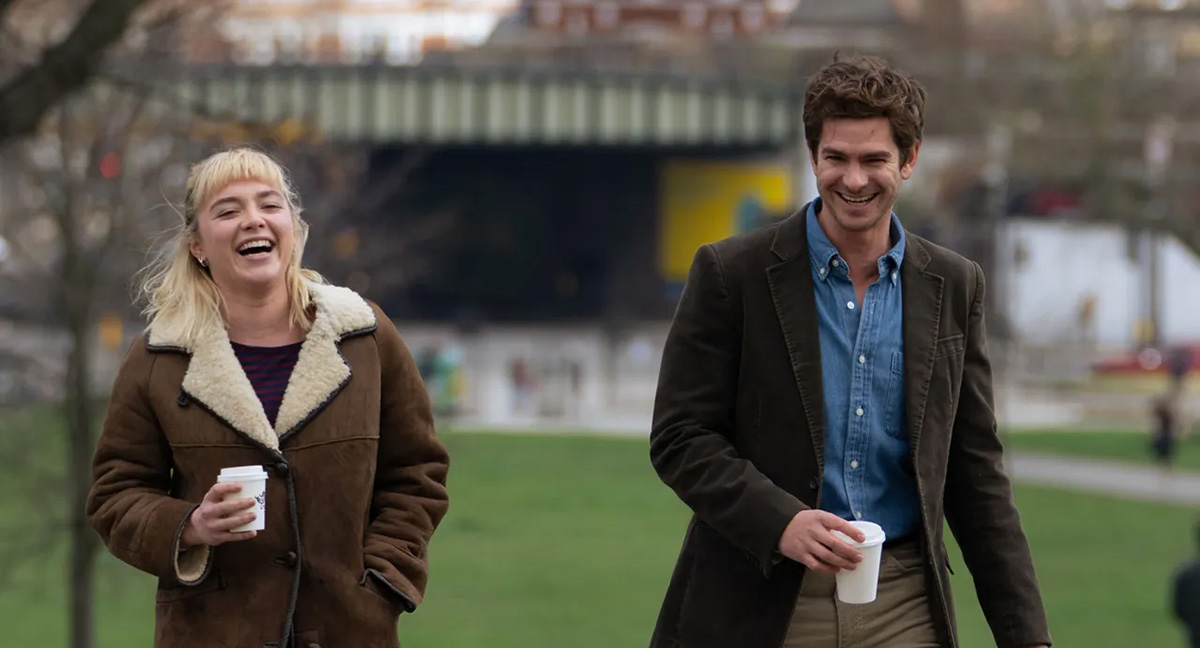There was an excellent film out last month called “The Outrun” in which Saoirse Ronan plays an alcoholic who returns to her isolated Scottish village and attempts to set her life straight. The narrative playfully maneuvers among scenes of her earlier drunken escapades in London, her return to her parents’ and her childhood hometown, as well as her AA meetings and interaction with her new “recovery” friends. I say the narrative moves playfully because, like a Terrence Malick film, we’re not jarred by these transitions in time, so much as we willingly go with the screenwriters on their journey to flesh out Ronan’s character. The non-linear scenes are connected by thoughts, like “Catch-22,” only less obvious.
Now, run the clock ahead to October, and director John Crowley “treats” us to “We Live in Time,” a good, old-fashioned weeper about a young British couple who fall in love, begin a family, and she develops terminal cancer. The connection here is that neither screenplay (“The Outrun” or “We Live in Time”) is told in chronological order. But for Crowley, it’s a deal-breaker. And that’s particularly unfortunate, because as protagonists Almut and Tobias, Florence Pugh and Andrew Garfield give two of the best performances I’ve seen this year.
“We Live in Time” begins with the medical diagnosis, backtracks to Almut’s pregnancy, then drops us even further back in time to when they first meet. And that’s just in the first ten minutes! Had Nick Payne’s original screenplay been told in a linear fashion, we would have been more invested in these characters. As it is, we feel like we’re simply being told about Almut and Tobias by a third party – almost like watching their home movies. And the unnecessary handheld camera technique plays into this “lack of seriousness.”
Florence Pugh (“Little Women,” “Oppenheimer”) is one of our best young actresses, and here she gives her best performance yet. She gives Almut a certain edge about her that plays as a nice contrast to Garfield’s anal retentive and super-organized Tobias character. Garfield (“99 Homes,” “Breathe,” “The Eyes of Tammy Faye”) has the less showy but perhaps more crucial role as the glue that holds their union together.
Coming off a non-yet finalized divorce when he meets Almut, Tobias often has trouble expressing his innermost feelings – sometimes to comic effect. Almut is more verbose but is certainly no disorganized mess. She’s an award-winning chef who owns and operates her own restaurant. While undergoing cancer treatment, she participates in a prestigious, monthslong European cooking contest, to the disdain of Tobias.
The problem is we assume Tobias is supportive of Almut’s decision all along, because the two scenes (her decision to participate, and his outrage thereof) are so separated within the jumbled mess of the screenplay. Likewise, it’s downright confusing when Almut explains she prefers to live another six happy months of life rather than 12 months of chemotherapy and surgery, which she may very well not survive anyway – then less than a half-hour of screentime later, we see her undergoing treatment! Had “We Live in Time” been presented in a conventional style, it would be easier to follow, and less unsettling.
Given the two Oscar-worthy performances, “We Live in Time” stands as a missed opportunity. And Crowley is the director who brought us the fabulous “Brooklyn” back in 2015. He could have had another “Brooklyn” here, but he loses momentum with the cluttered narrative. Ironically, “Brooklyn” is the film that brought Saoirse Ronan her first big role.
Much has been made about the sad and touching ending of “We Live in Time,” but while it is moving, Almut’s demise is telegraphed so early on as to eliminate any sense of miracle or wonder. “Brooklyn” (in which nobody dies) touches the heart more deeply than “We Live in Time.”
I would also like to contrast “We Live in Time” with the 1970 hit “Love Story.” It’s a very similar story – albeit without the young daughter – but it is offered in a continuous timeline. By the time we learn of Jenny’s terminal diagnosis, we’re already invested in her relationship with Oliver. Therefore, the ending tugs at our heartstrings more so than in Crowley’s film. Of particular irony here, neither Ryan O’Neal nor Ali MacGraw provided anywhere near the strong acting performances of Garfield or Pugh. But they were cast in a much better film. So go see “We Live in Time” if you are so inclined. But then look for “Love Story” on a streaming service, and you’ll see what I mean.





